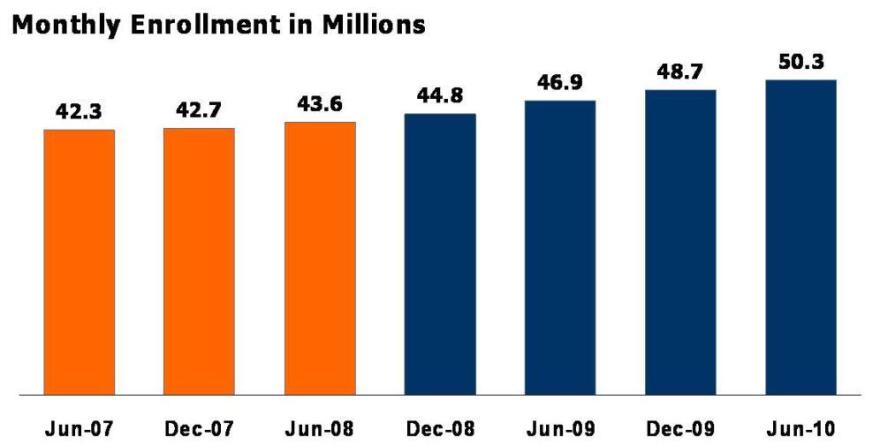Medicaid sure is popular. And that's a big problem for state budgets.
These days the health program for the poor is claiming a bigger slice of states' spending than even K-12 education, says a report from the National Association of State Budget Officers.
All told, Medicaid is expected to grab 23.6 percent of states' spending in fiscal 2011, up from 22.3 percent the year before.
For comparison, spending on elementary and secondary education shool is expected to claim 20.1 percent of spending in fiscal 2011, down from 20.5 percent in 2010.
What's going on? The bad economy has more people enrolling — more than 50 million in Medicaid as of June last year.

Overall Medicaid spending for fiscal 2011 looks to be about $399 billion, up 10.1 percent over the previous year.
Medicaid is funded by money from the states and the federal government. And some critics say analyses like NASBO's overstate the burden by reporting on the total spending, without showing how much of the revenue for the program comes from the feds and other sources.
Looked at that way, Medicaid ranks second or third behind basic education in most state budgets.
Still, states' share of the 2011 bill is increasing by an estimated 16 percent while the federal chunk is risking by 6.9 percent over fiscal 2010, according to NASBO.
Almost every state is working to contain the rising cost of Medicaid.
A nurse called NPR's Talk of the Nation Tuesday to ask Dr. Donald Berwick, who ran Medicare and Medicaid until early this month, why Medicaid doesn't require even small copayments for emergency room care. That might help encourage people not to overuse emergency rooms and seek less costly primary care, she suggested.
Berwick answered that it's a tricky proposition. "A lot of Medicaid patients are very much on the edge, and that copayment may be the thing that dissuades them from coming in to have a symptom treated in early stages," he said. "So, yes, of course there can be abuses. But I'm not sure I'd use copayment as the mainstay. We need to build a stronger primary care system for Medicaid patients, better coordinated care. And we'll see costs fall and quality go up."
Copyright 2021 NPR. To see more, visit https://www.npr.org.



